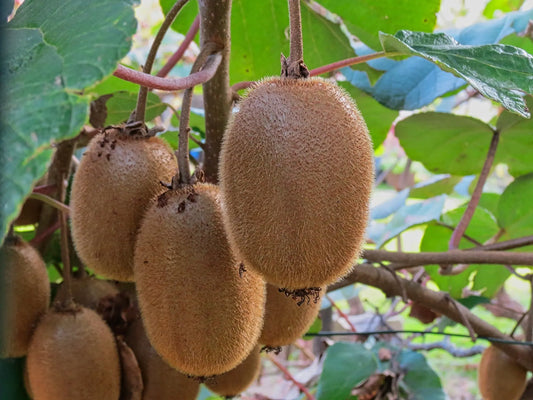-
Delivery from 10 plants to France, Switzerland and Europe
-
Kiwi Plants Wholesale Supplier
-
Quality Kiwi Plants
-
Secure payment - 3X payment
Our Atlas Kiwi plants for professional Kiwi growers
The prices shown are our base prices for large volumes. Depending on the quantity ordered and the producers’ pricing scales, the rate may be adjusted upward. Each quote is personalized to ensure you receive a fair price.
-
Kiwi Atlas plant franc - conventional 4-cell tray
Regular price €1,50 EURRegular price
Collapsible content
When to Plant? When to Harvest? - Growing Guide / Diseases / Pests
You can find all our planting advice for kiwis in France here.
How profitable is kiwi production in France?
Planting / Harvesting Calendar:
Kiwi Planting and Harvesting Calendar
Production schedule for a one-hectare plot of kiwi
Self-fertile / Male Female
What is a self-fertile plant? Our self-fertile kiwi plants
What is a Male/Female plant? Our Male/Female Kiwi plants (Dioecious plants)
Kiwi Pollination - How to Promote It?
Free Plants, Grafted Plants, Rootstocks:
Kiwi - Rootstock or Free Plants: How to Choose?
Kiwi Rootstock Comparison: Bounty 71 vs Roki
Kiwi Grafting Techniques for Professionals
Plot layout / Planting technique
T-bar Method: The T-bar Method: A Complete Guide to Planting Kiwis in France
Pergola Method: The Pergola Method: A Complete Guide to Planting Kiwis in France
Fertilization / manuring of kiwi from planting to production
Kiwi Bud Break - Guide to Successful Kiwi Bud Break
Lignification - Optimizing lignification / Heightening of kiwis
Kiwi Pruning - How to Optimize Kiwi Pruning in France for Exceptional Fruit Production
Kiwi Plants In Vitro - Micro Propagation of Kiwi Plants
Kiwi - Thinning Kiwis. Why and When to Do It?
When and how to harvest kiwis?
Irrigation / Antifreeze System
Kiwi Irrigation - Water Needs of Kiwi Farms in Southern France
Antifreeze System - Antifreeze spray for kiwis: an essential solution for professional producers
Diseases that can affect kiwi crops in France
Fighting Kiwi Bacterial Canker: Symptoms, Prevention, and Professional Solutions
Fighting Kiwi Botrytis: Symptoms, Prevention and Professional Solutions
Fighting Kiwi Phytophthora: Symptoms, Prevention and Professional Solutions
Fighting Sooty Leaf and Fly Dropping Disease in Kiwi Crops: Symptoms, Prevention and Professional Solutions
Fighting Kiwi Scab: Symptoms, Prevention and Professional Solutions
Fighting Kiwi Anthracnose: Symptoms, Prevention and Professional Solutions
Fighting Kiwi Chlorosis: Symptoms, Prevention and Professional Solutions
Fighting Phaeomoniella in Kiwis: Symptoms, Prevention and Professional Solutions
Pests that can affect kiwi crops in France
Fighting the Kiwi Brown Stink Bug: Symptoms, Prevention and Professional Solutions
Fighting Kiwi Mealybug: Symptoms, Prevention and Professional Solutions
Fighting the Voracious Kiwi Mealybug: Symptoms, Prevention and Professional Solutions
Fighting the Kiwi Leafhopper: Symptoms, Prevention and Professional Solutions
Fighting Kiwi Thrips: Symptoms, Prevention and Professional Solutions
Controlling Root Knot Nematodes in Kiwi: Symptoms, Prevention and Professional Solutions
Collection: Our Atlas Kiwi plants for professional Kiwi growers
Kiwi Atlas Technical Sheet:
Economic considerations
- Average yield in kg per tree: As the Atlas Kiwi is a male variety, it does not produce fruit and therefore does not have a yield in kg per tree. However, it is essential for pollination of female varieties.
- Recommended Commercial Use: Atlas Kiwi is primarily used as a pollinator for female kiwi varieties such as Hayward. It is not grown for the production of fruit for consumption.
Plant characteristics
- Mature tree size: The Atlas Kiwi reaches a height of 5 to 6 meters at maturity.
- Vigor and habit: This is a very vigorous climbing plant with a climbing habit that requires solid support to fully develop.
- Need for Staking: Yes, the Atlas Kiwi requires a trellis, pergola, or sturdy support to climb and grow.
- Longevity: Kiwis in general can live between 50 and 100 years.
- Earliness: The Atlas Kiwi is a male variety that does not produce fruit, so this characteristic does not apply. However, it does pollinate female varieties whose fruit generally ripens late, harvesting in November and January.
- Fruiting Period: The Atlas Kiwi produces white, fragrant male flowers in spring, usually in May or June, which are essential for pollination of the female varieties. There is no fruiting in terms of edible fruit production.
- Self-fertility: The Atlas Kiwi is not self-fertile, being a male variety. It requires the presence of female plants for pollination.
- Recommended Pollinators: The Atlas Kiwi is a pollinator for female kiwi varieties like the Hayward Kiwi. One male plant can pollinate 5 to 8 female plants.
- Disease Resistance: The Atlas Kiwi is not specifically mentioned as having any particular disease resistance. However, kiwis in general can be affected by diseases such as Pseudomonas syringae pv. actinidiae (Psa).
- Pest Resistance: Sources do not provide specific information on pest resistance of Atlas Kiwi.
- Drought resistance: Atlas Kiwi is drought resistant.
- Limestone Sensitivity: The Atlas Kiwi is not very sensitive to limestone, but prefers well-drained, cool soil.
- Susceptibility to root asphyxiation: Sources do not provide specific information on the susceptibility of Atlas Kiwi to root asphyxiation. However, it is important to note that fruit plants in general require well-drained soil.
Kiwi Atlas: Essential Pollinator Supported by Kiwiverse
The Atlas kiwi is much more than a climbing plant: it's an essential asset for any kiwi grower looking to maximize the productivity of their female varieties. Vigorous, hardy, and prolific in male flowers, it guarantees efficient and sustainable pollination. As a specialist wholesale supplier, Kiwiverse offers a wide range of kiwi plants, tailored to the needs of professionals.
Origin and Role of the Atlas Kiwi in Kiwi Orchards
Native to the mountains of China, the Atlas Kiwi belongs to the genus Actinidia . Unlike female varieties, it does not produce edible fruit. However, its role as a pollinator is absolutely vital to ensure optimal production of varieties such as the Hayward Kiwi or the Minkigold.
At Kiwiverse, we understand how crucial it is to ensure a smooth supply and personalized technical advice to maximize yields. Buying kiwi plants from Kiwiverse means choosing dedicated expertise.
Features of the Kiwi Atlas
Powerful Male Plants
- Growth: The Atlas Kiwi is a vigorous climber, reaching 5 to 6 meters with proper training.
- Flowers: White and fragrant, they appear in May or June and produce abundant and fertile pollen.
- Aesthetics: With its deciduous foliage and changing colors, the Atlas Kiwi also adds a decorative touch to the orchard.
Hardiness and Longevity
- Cold resistance: Tolerates temperatures down to -20°C.
- Lifespan: Between 50 and 100 years, making it a long-term investment.
Cultural Requirements for a Successful Atlas Kiwi
Cross-pollination
- Role: Pollinates between 5 and 8 female plants thanks to a generous production of male flowers.
- Placement: Plant in close proximity to female varieties for maximum effectiveness.
Soil and Exposure
- Ideal soil: Well-drained, rich in organic matter and free of limescale.
- Exposure: Direct sun to encourage abundant and vigorous flowering.
Kiwi Atlas Maintenance
Size
Maintain a manageable shape and stimulate flowering by regularly pruning overly long or overgrown shoots.
Watering
Avoid overwatering while maintaining evenly moist soil, especially during the flowering season.
Fertilization
Apply a nitrogen-rich fertilizer in spring to support rapid growth and abundant flower production.
Why Choose Kiwiverse to Buy Atlas Kiwi Plants?
As a specialist wholesale supplier of kiwi plants, Kiwiverse is the go-to source for growers looking to successfully grow their kiwifruit. Our services include:
- A wide range of kiwi plants, including rootstocks and grafted plants.
- Delivery throughout France, directly to your plot or farm.
- Dedicated technical support, meeting the specific needs of kiwi growers.
Whether you are a market gardener or a nurseryman looking to diversify your crops, Kiwiverse supports you with tailor-made solutions.
Order your Atlas Kiwi plants now and take advantage of our producer prices!
Benefits of Kiwi Atlas with Kiwiverse
- Improved Yields: Increases the size and quality of fruit on female plants.
- Exceptional Longevity: A robust and durable plant, adapted to various climates.
- Ease of Maintenance: Kiwiverse offers personalized technical advice to simplify management.
- Decreasing Prices: Take advantage of competitive rates based on order volume.
Frequently Asked Questions
- Does the Atlas Kiwi produce fruit? No, it is a male variety bred only to pollinate female varieties.
- How to maximize the effectiveness of Atlas Kiwi? Plant it near female plants, in well-drained, sunny soil.
- Does Kiwiverse deliver everywhere in France? Yes, with careful and fast delivery directly to your farm.
- What are the benefits of buying kiwi plants from Kiwiverse? Kiwiverse offers simple and seamless sourcing, competitive pricing, and dedicated technical support.
- When should I prune an Atlas Kiwi? Pruning is done in winter to control growth and encourage flowering in spring.
- How many female plants can an Atlas Kiwi pollinate? One plant can pollinate between 5 and 8 female plants.
Conclusion
The Atlas Kiwi is a key player in the production of high-quality kiwifruit. By ensuring efficient pollination, it optimizes the productivity of female varieties while remaining easy to grow and maintain. With Kiwiverse, the kiwi plant specialist, you benefit from a tailor-made service, rapid supply, and unparalleled technical expertise. Buy your Atlas Kiwi plants now and launch your kiwi orchard successfully!

